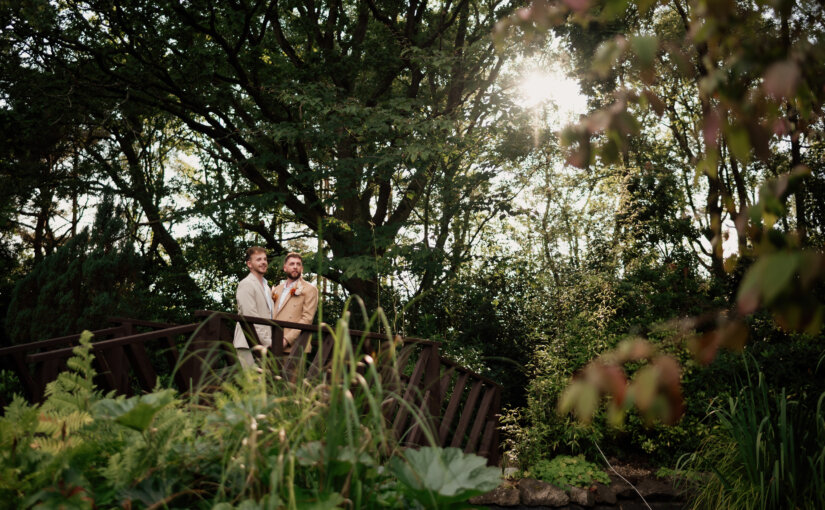Guest article written by the lovely Laura Bareham. Laura is a queer wedding photographer based in Warrington, Cheshire, who focuses on creating a safe, inclusive environment for all couples. Laura wholeheartedly believes that your wedding day should be exactly how you want it, free from the shackles of expectation or tradition. Through a unique and unobtrusive storytelling approach, she creates photographs that capture the true personality and spirit of your wedding day. Outside of photography, Laura is happiest pottering in the garden, curled up with a book or watching corny police dramas.
You can check out Laura’s incredible work directly via her website or Instagram, or explore her wonderful profile right here on Bridebook.
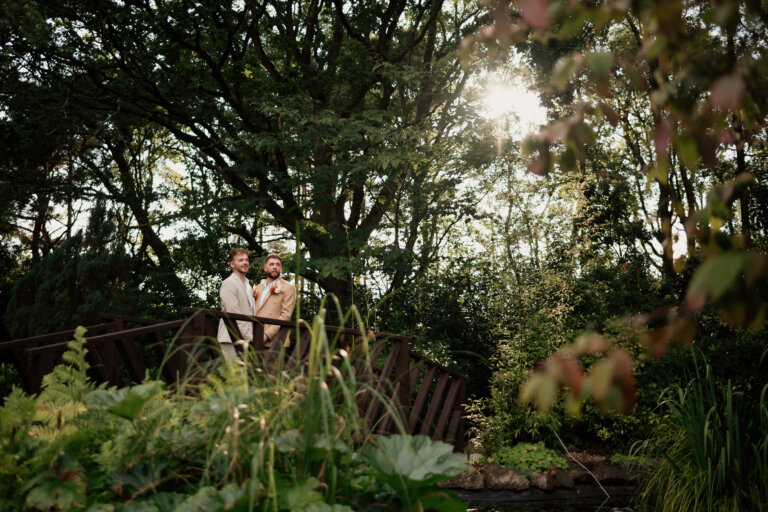
I’m Laura, and I’m a queer and inclusive wedding photographer based in Cheshire. I got engaged to my wonderful partner Soph in December 2023, and am currently fully immersed in my own wedding planning! I’ve always focused my business on being inclusive, providing a safe space for queer people to be themselves free of judgements or assumptions, and this has only become more important to me since planning my own wedding.
Planning a wedding is a big undertaking for any couple: alongside all the joy and excitement are a whole raft of decisions to make, suppliers to book and tasks to tick off! With the wedding industry being largely focused on straight cisgender people, this process can be especially daunting for queer people. In my experience (and that of many of my queer couples), when people hear the word ‘wedding’, they automatically assume that it’s a heterosexual wedding. Whilst as queer people most of us experience this sort of assumption on a regular basis throughout our lives, it can be particularly challenging during such a sensitive, vulnerable, and personal time as planning your wedding.
Information and resources for queer couples are becoming easier to come by, but this area is arguably still lagging a fair way behind. Some might say that we shouldn’t need separate guidance or advice at all and that we should stop talking about the differences between cis-het and queer weddings, and so many queer couples have a positive, affirming wedding experience; but the reality is that queer people do often come up against additional challenges when planning their big day. In this article, I hope to provide a bit of information and some helpful tips to make that planning process a little smoother!
It’s important at this point to address the fact that there is no single queer experience, and no single wedding planning experience. I spend a lot of my life immersed in the wedding industry and know a fair bit about how it all works; however, that’s still just my perspective. Much of this article will also apply to queer and cis-het couples alike – we all move through the wedding planning process in our own way, every wedding is unique and there are no right or wrong answers.
Anyway, enough preamble – onto the useful stuff!
1) Beware tips and advice
Okay, this one might be a bit of a strange one to start with but bear with me. Anyone who is planning or has planned a wedding knows that unsolicited wedding advice is lurking around every corner, and it can be incredibly overwhelming knowing what you want to do with everyone and their dog sticking their two pence in. Unfortunately, there can also be those people who just don’t want to accept or understand the things that are important to you and who do not have your best interests at heart. Add to that the fact that the majority of online resources are cis-het focused, and your efforts to find useful advice and guidance can have you in a sweat in ten seconds flat.
At the end of the day, the only person who knows what’s best for you, is you. By all means, make those Pinterest boards, save inspo pics and ask your friends and family for help when you’re making decisions, but just remember that everyone views a wedding through their own lens. Your wedding day is about you, and ultimately, what you say goes!
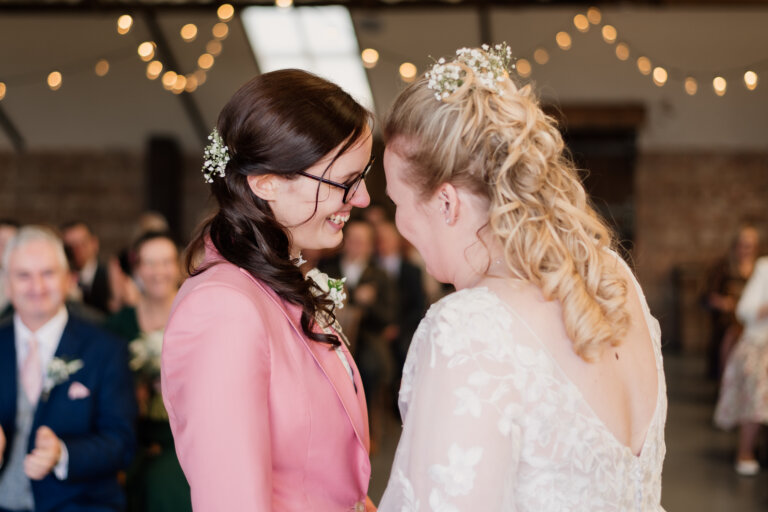
2) Give yourself plenty of time to plan
Planning a wedding can throw up some big questions, not just about table plans and décor options, but about who you are, how you see yourself and what a wedding means to you. You’re likely to have different perspectives and opinions on things, so prioritise communication and make space to discuss each person’s priorities openly and without judgement. Forget everything you think you know about weddings; go through each element individually and establish how you as a couple relate to each element. There are no rules!
3) Think carefully about your guest list
I think anyone who has planned a wedding has found the guest list to be a point of contention at some point throughout the process! Whether it’s minimum or maximum numbers for your chosen venue, cost per head for the wedding breakfast or debates about plus ones, crafting your perfect guest list can be a challenge. Keep communication open and honest with your partner about guest list priorities and who each of you feels comfortable inviting to share your day with you.
It would also feel remiss of me not to mention negative reactions from friends, families and acquaintances at this point. Sending wedding invites can be a really vulnerable process, especially for queer couples. Not everyone is accepting of queer marriage, and the invite process can often bring homophobia into the light. One of my couples experienced several invite rejections from extended family members due to them ‘politely accepting our relationship but choosing not to attend because it is a queer wedding’.
You may not be able to change people’s views, but you can decide who to invite to your wedding. Protect yourself from negativity and keep yourself safe wherever possible.
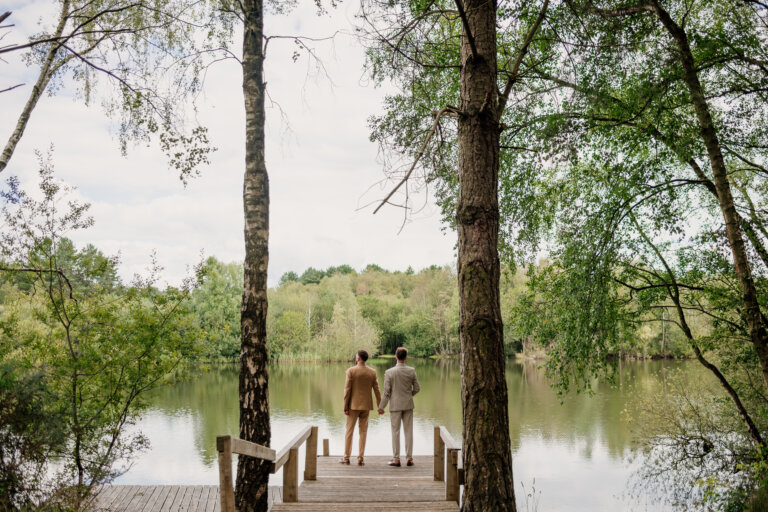
4) Approach traditions with caution
Wedding traditions are so hard-wired into many of us that it can be hard to think outside of the box when it comes to your own plans. Telly, films and the world around us have shaped our idea of what a wedding is ‘supposed’ to look like, and queer people are very rarely reflected within this. Your wedding is a celebration of you, and you can do as you please regardless of what’s ‘usually’ done.
There is also a lot of history attached to wedding traditions. Some good examples…
- In the Western world, a bride wearing white symbolised purity and virginity.
- Some say that bridesmaids come from a time when brides were seen as property to be kidnapped, stolen or killed by rivals, whilst others say it was to confuse evil spirits so they wouldn’t attack the bride.
- A bride being given away by her father used to signify a transfer of ownership from one man to another.
- Getting married in a church isn’t an option for the vast majority of queer people (on that note, if you’re looking for some inspiration for non-traditional wedding venues, check out this stunning styled shoot in Manchester City Centre).
You get the gist – these traditions are all but meaningless in the modern world whether you’re queer or not, yet they’re so often followed unquestioningly.
That said, just because you’re planning a queer wedding doesn’t mean you have to do away with tradition entirely. If a tradition feels good for you, run with it! Just don’t feel pressured to do something that is at odds with your morals, relationship, or plain common sense just because tradition told you to.
When I think of a queer wedding that was the perfect blend of tradition, modernity and queer joy, I think of Jon and Jay. Check out their dreamy Cheshire wedding here.
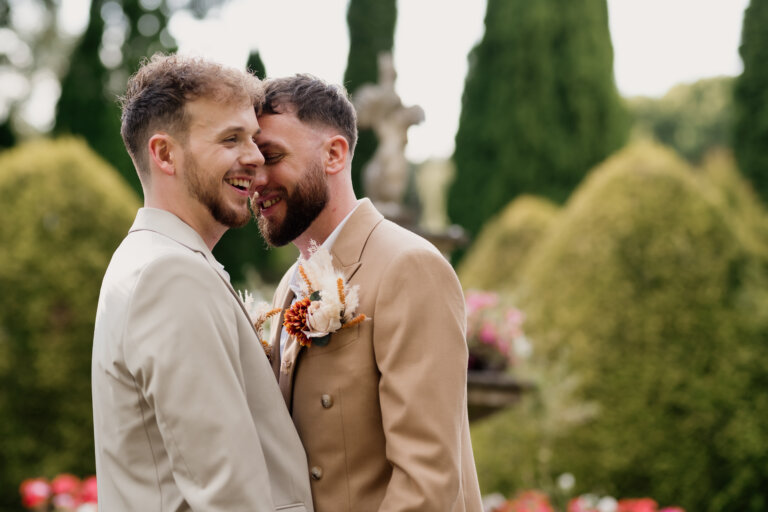
5) Consider rethinking your wedding terminology
The possibilities here are endless. If you’re feeling a disconnect with traditional wedding terminology, why not come up with your own alternatives? In my experience I’ve come across alternatives such as ‘marriers’ instead of ‘couple’ (after all, not all marriages include a bride and/or groom and not all marriages consist of two people); ‘bests’ instead of bridesmaids and groomsmen; and a whole host of other terminology tweaks which have made peoples’ wedding days feel more ‘them’.
If you do decide to use alternative terms during your wedding planning and big day, consider sharing these with your suppliers and loved ones if you feel safe and comfortable doing so. As a supplier, I always do my best to use whichever terms, words and phrases make my couples feel most comfortable, and those who love and care for you should make an effort to do the same.
Which leads me neatly onto…
6) Choose wedding suppliers who align with your values and vision
There are so many incredible queer and inclusive suppliers out there! From venues to florists to ateliers to DJs, queer people and allies are everywhere and the wedding industry is no exception. Each individual supplier will contribute to the feel of your wedding day and your overall experience, so it makes sense to have a think about what’s important to you and book people who align with this.
I’ve met couples who have proudly planned their wedding using exclusively queer vendors, whereas for other couples this is much less of a priority. Not all queer vendors will include their sexuality on their websites, and not all allies will shout about it over socials. That doesn’t mean that they won’t provide a fantastic, safe and inclusive experience for you on your wedding day. Often, we just get a ‘feel’ for people and that will be different for everyone, so I’d recommend doing your research, having a good chat with suppliers before booking to make sure you feel comfortable with them, and going with your heart.
It can feel intimidating knowing where to start when it comes to booking suppliers, but there are lots of brilliant directories out there which provide a great starting point, including some fantastic queer-specific ones and, of course, Bridebook!
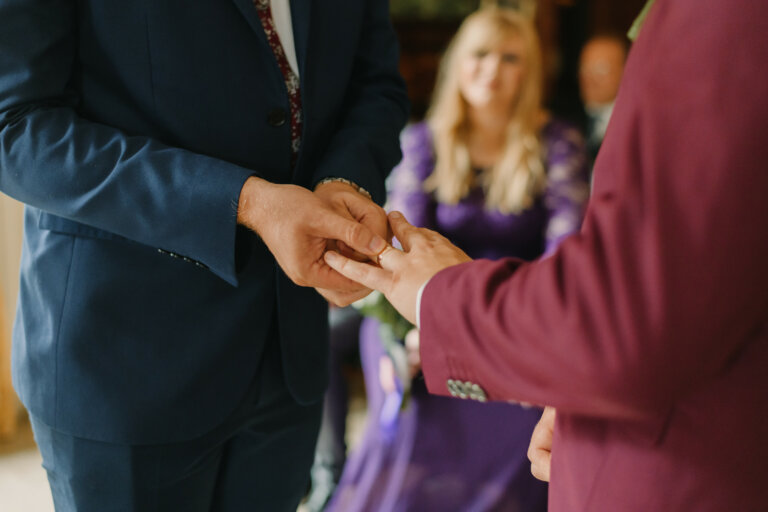
7) Give yourself permission to wear whatever makes you happy
“Well, you’re both brides so of course you’ll both wear a dress” – an actual thing an actual person said to my partner and I about our wedding. Gender expectations around attire is by no means limited to queer weddings, but it’s the type of comment that a lot of us hear during planning.
The way we choose to present ourselves to the world is an incredibly personal choice, and it’s so important that on your wedding day you can wear something that feels good, feels affirming and feels you. Some of us instinctively know from the offset what we want to wear (I always knew it was going to be a dress for me), but others don’t have that same certainty. The heavy stereotypes around wedding clothing can also bring up some complicated feelings and emotions, so give yourself plenty of time to plan your outfit so you can navigate these moments without looming time pressures.
If traditional wedding clothing isn’t hitting the spot for you, try thinking outside the box:
- Would you feel comfortable moving away from ‘traditional’ wedding colours? What colours do you love? (Enter past bride El’s pink suit of dreams – check it out here).
- What clothes do you already own that make you feel great? Is there a version of this that you’d feel comfortable wearing on your wedding day?
- Consider shopping in less traditionally wedding-y places, such as high street stores, charity shops and eBay/Vinted.
- Whilst this may not be an option that is financially viable to all, you might consider having an outfit custom-made, giving you total freedom over what you want to create.
- It’s also worth doing a bit of an audit of your friends and family’s skillsets – you might already know someone who can put together the wedding outfit of your dreams!
One of my 2024 couples is the perfect example of doing-what-works-for-you – they’ve made their own dresses, neither are wearing white and they’ve shared every step of the creation process. The result is two very happy brides with completely custom outfits which are going to make them feel absolutely incredible on the day! Nobody should have to compromise on that kind of feeling.
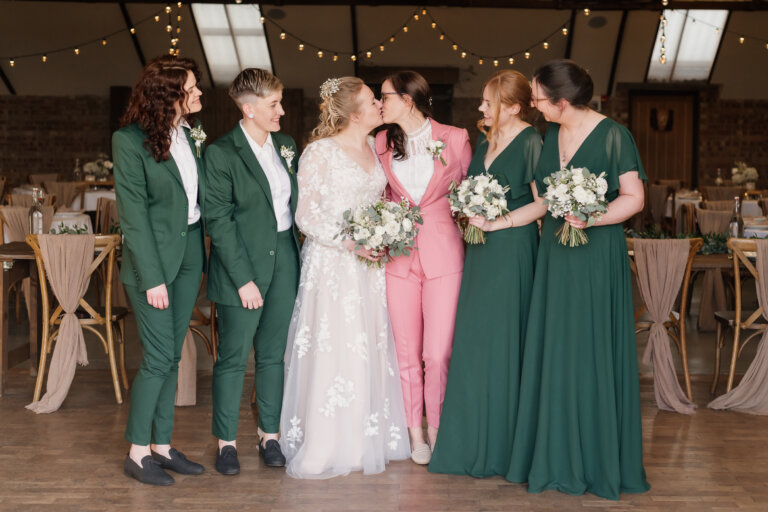
8) Choose your shopping experience wisely
There are expectations at literally every turn when you’re planning a wedding, and shopping for your wedding outfit is no exception (especially for brides). I know when I was shopping for my wedding dress, I felt a bit paralysed by how to go about it, especially as I wasn’t planning to have a traditional bridal party – who was I supposed to invite? Would my mum be hurt if I didn’t ask her to go with me? What if I loved something, but didn’t get the reaction I wanted from the people who were with me? Did it all have to be such a big deal?
In the end, the appointments where I felt most comfortable were the ones I went to on my own. For some of them, I didn’t even tell anyone I was going. If you’re feeling overwhelmed, cut the noise and consider shopping alone, or carefully choose the person that you feel is going to give you what you need during that experience. Also, if in-person shopping gives you the ick, start your research online and create a focused shortlist of places that feel safe and comfortable for you to visit.
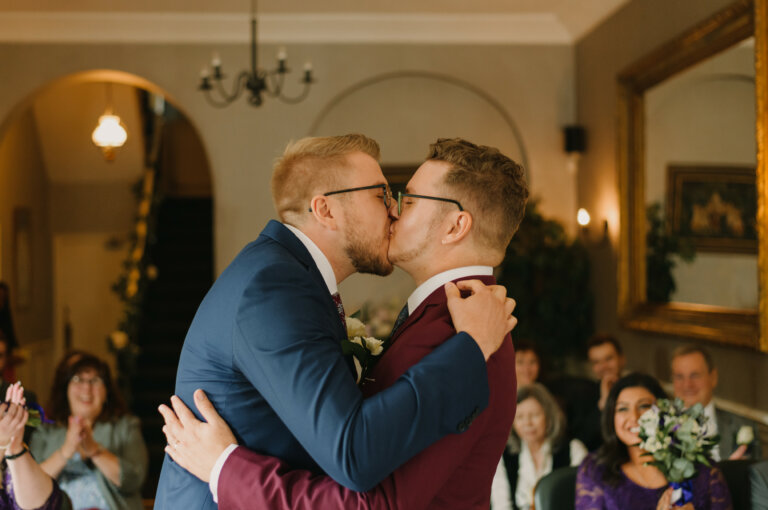
9) Think flexibly about hen/stag celebrations
Another area of wedding planning that is rife with traditions and expectations is hen and stag celebrations, and these expectations are also heavily gendered. This may mean that some queer couples feel a significant disconnect with the idea of a hen or stag do – Soph and I definitely did! It’s fair to say that these kinds of celebrations aren’t for everyone no matter what kind of couple you are, but if you do want to celebrate with loved ones without the heavily gendered traditions, here is a reminder that your hen or stag do can look however you want it to. Consider having a joint celebration, invite anyone you want regardless of gender, call it by a different name if hen or stag doesn’t feel like a good fit, steer clear of gendered gimmicks… or don’t have one at all if you don’t want to!
10) Do your research around honeymoon destinations
For many queer people, checking how safe and accepted we’ll be in any given destination is a standard part of planning any holiday. This becomes even more important during honeymoon planning, as more couples consider far-flung destinations where legality and culture can vary significantly to countries closer to home. In some popular honeymoon destinations, such as the Caribbean and the Maldives, homosexuality is still illegal; other countries have relaxed their laws around homosexuality in recent years, but local culture is still not welcoming to queer people and therefore visiting may not be safe.
There are many wonderful honeymoon destinations where queer people are welcomed with open arms including most parts of Greece, Thailand and Italy, so there are still great options out there – just make sure you do your research before you book.

11) Do whatever you want
I guess this really just sums up the whole article. Ultimately, your wedding is your day and how it plays out is your choice. If something works for you, do it. If it doesn’t, don’t! By all means, ask those you trust for advice and support where needed and utilise the enormous raft of general wedding-related information and inspiration available online, but just be sure not to lose sight of the most important thing – you!
If you’re looking for a bit more queer wedding inspiration or information, I’ve got a few more blogs over on my website that you might find interesting:
- How to make your wedding more inclusive
- Inclusive wedding venues in Manchester
- LGBTQ+ wedding songs
- Jack & Russ’ intimate Staffordshire wedding
A huge thank you to Pippa Volans, Esme Whiteside, Kieran Bellis, my couples and my loved ones who generously shared their thoughts, feelings and experiences to help me write this article.
